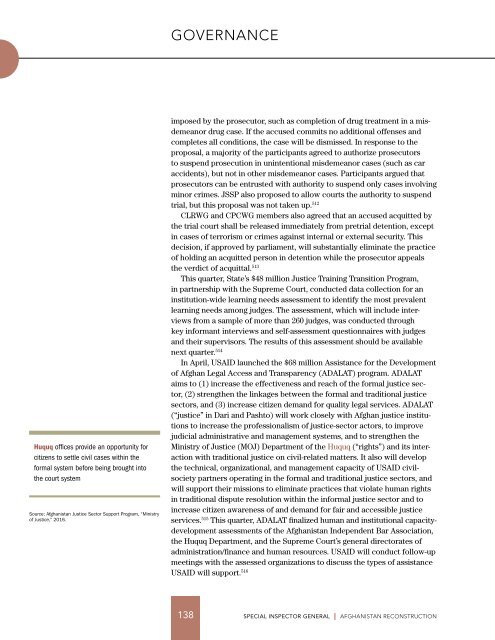SIGAR
2017-01-30qr
2017-01-30qr
Create successful ePaper yourself
Turn your PDF publications into a flip-book with our unique Google optimized e-Paper software.
GOVERNANCE<br />
Huquq offices provide an opportunity for<br />
citizens to settle civil cases within the<br />
formal system before being brought into<br />
the court system<br />
Source: Afghanistan Justice Sector Support Program, “Ministry<br />
of Justice,” 2016.<br />
imposed by the prosecutor, such as completion of drug treatment in a misdemeanor<br />
drug case. If the accused commits no additional offenses and<br />
completes all conditions, the case will be dismissed. In response to the<br />
proposal, a majority of the participants agreed to authorize prosecutors<br />
to suspend prosecution in unintentional misdemeanor cases (such as car<br />
accidents), but not in other misdemeanor cases. Participants argued that<br />
prosecutors can be entrusted with authority to suspend only cases involving<br />
minor crimes. JSSP also proposed to allow courts the authority to suspend<br />
trial, but this proposal was not taken up. 512<br />
CLRWG and CPCWG members also agreed that an accused acquitted by<br />
the trial court shall be released immediately from pretrial detention, except<br />
in cases of terrorism or crimes against internal or external security. This<br />
decision, if approved by parliament, will substantially eliminate the practice<br />
of holding an acquitted person in detention while the prosecutor appeals<br />
the verdict of acquittal. 513<br />
This quarter, State’s $48 million Justice Training Transition Program,<br />
in partnership with the Supreme Court, conducted data collection for an<br />
institution-wide learning needs assessment to identify the most prevalent<br />
learning needs among judges. The assessment, which will include interviews<br />
from a sample of more than 260 judges, was conducted through<br />
key informant interviews and self-assessment questionnaires with judges<br />
and their supervisors. The results of this assessment should be available<br />
next quarter. 514<br />
In April, USAID launched the $68 million Assistance for the Development<br />
of Afghan Legal Access and Transparency (ADALAT) program. ADALAT<br />
aims to (1) increase the effectiveness and reach of the formal justice sector,<br />
(2) strengthen the linkages between the formal and traditional justice<br />
sectors, and (3) increase citizen demand for quality legal services. ADALAT<br />
(“justice” in Dari and Pashto) will work closely with Afghan justice institutions<br />
to increase the professionalism of justice-sector actors, to improve<br />
judicial administrative and management systems, and to strengthen the<br />
Ministry of Justice (MOJ) Department of the Huquq (“rights”) and its interaction<br />
with traditional justice on civil-related matters. It also will develop<br />
the technical, organizational, and management capacity of USAID civilsociety<br />
partners operating in the formal and traditional justice sectors, and<br />
will support their missions to eliminate practices that violate human rights<br />
in traditional dispute resolution within the informal justice sector and to<br />
increase citizen awareness of and demand for fair and accessible justice<br />
services. 515 This quarter, ADALAT finalized human and institutional capacitydevelopment<br />
assessments of the Afghanistan Independent Bar Association,<br />
the Huquq Department, and the Supreme Court’s general directorates of<br />
administration/finance and human resources. USAID will conduct follow-up<br />
meetings with the assessed organizations to discuss the types of assistance<br />
USAID will support. 516<br />
138<br />
SPECIAL INSPECTOR GENERAL I AFGHANISTAN RECONSTRUCTION







